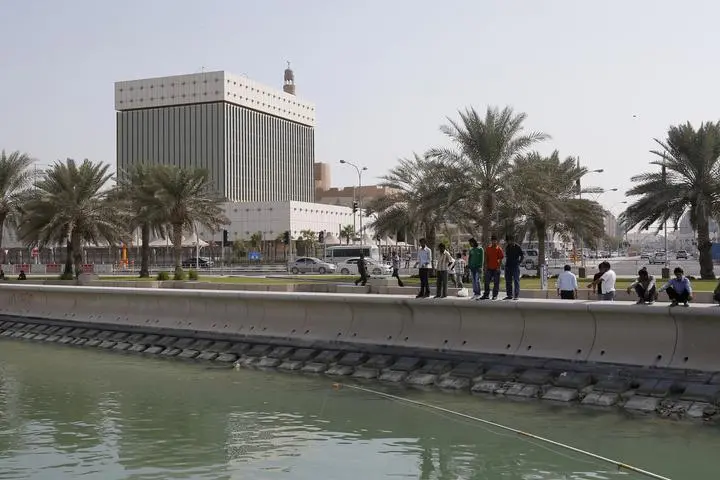PHOTO
DUBAI- Slowing withdrawals of deposits from Qatari banks permitted Qatar's government to stop pumping money into the banks last month to shield them from sanctions imposed by other Arab countries, central bank data showed on Tuesday.
Banks and investors from Saudi Arabia, the United Arab Emirates, Bahrain and Egypt began pulling deposits and other funds out of Qatar in June, when those four states cut diplomatic and trade ties with Doha.
The deposit outflow initially put the balance sheets of some Qatari banks under pressure, and the government responded by injecting billions of dollars of its own money into accounts at the banks. Much of the money came from the country's sovereign wealth fund, the Qatar Investment Authority (QIA).
But the outflows are now slowing, as the four states run out of money left to withdraw. That is reducing the need for the government to aid the banks.
In October, foreign customers' deposits at banks in Qatar - the vast majority in the form of foreign-currency deposits - fell by only 5.1 billion riyals ($1.4 billion) from the previous month, to 137.7 billion riyals, the data showed.
The decline was slower than falls of 6.2 billion riyals in September, 8.2 billion in August, 13.4 billion in July and 14.0 billion in June.
Meanwhile, the Qatari public sector's deposits with local banks fell slightly in October after soaring during the initial months of the sanctions, indicating the government was no longer pumping fresh money into the system as a whole.
The deposits dropped by 4.2 billion riyals to 298.4 billion riyals last month, after increasing by 7.2 billion riyals in September and rising by more than three times that amount in each of the previous three months.
The central bank has not responded to queries about details of official support to banks, but central bank governor Sheikh Abdullah bin Saud al-Thani said last month that the government and the central bank had more than enough financial resources to protect the banking system from outflows.
After the sanctions were imposed, Qatari banks' borrowing from foreign banks also fell sharply as institutions from the four Arab countries stopped extending loans.
October's data suggested, however, that Qatari banks have begun to have success filling this gap by increasing their borrowing from Asia and Europe.
Qatari banks owed banks outside the country 171.7 billion riyals in October, up from 169.5 billion riyals in September; it was the first increase since the sanctions were imposed. In May, before the sanctions, the figure stood at 234.5 billion riyals.
The October data also showed Qatar's central bank continuing to increase its lending to local banks through securities repurchase agreements. The banks owed 37.5 billion riyals to the central bank last month, up from 35.6 billion riyals in September and just 3.4 billion riyals before the sanctions.
(Reporting by Andrew Torchia, Editing by William Maclean) ((andrew.torchia@thomsonreuters.com; +9715 6681 7277; Reuters Messaging: andrew.torchia.thomsonreuters.com@reuters.net))
Banks and investors from Saudi Arabia, the United Arab Emirates, Bahrain and Egypt began pulling deposits and other funds out of Qatar in June, when those four states cut diplomatic and trade ties with Doha.
The deposit outflow initially put the balance sheets of some Qatari banks under pressure, and the government responded by injecting billions of dollars of its own money into accounts at the banks. Much of the money came from the country's sovereign wealth fund, the Qatar Investment Authority (QIA).
But the outflows are now slowing, as the four states run out of money left to withdraw. That is reducing the need for the government to aid the banks.
In October, foreign customers' deposits at banks in Qatar - the vast majority in the form of foreign-currency deposits - fell by only 5.1 billion riyals ($1.4 billion) from the previous month, to 137.7 billion riyals, the data showed.
The decline was slower than falls of 6.2 billion riyals in September, 8.2 billion in August, 13.4 billion in July and 14.0 billion in June.
Meanwhile, the Qatari public sector's deposits with local banks fell slightly in October after soaring during the initial months of the sanctions, indicating the government was no longer pumping fresh money into the system as a whole.
The deposits dropped by 4.2 billion riyals to 298.4 billion riyals last month, after increasing by 7.2 billion riyals in September and rising by more than three times that amount in each of the previous three months.
The central bank has not responded to queries about details of official support to banks, but central bank governor Sheikh Abdullah bin Saud al-Thani said last month that the government and the central bank had more than enough financial resources to protect the banking system from outflows.
After the sanctions were imposed, Qatari banks' borrowing from foreign banks also fell sharply as institutions from the four Arab countries stopped extending loans.
October's data suggested, however, that Qatari banks have begun to have success filling this gap by increasing their borrowing from Asia and Europe.
Qatari banks owed banks outside the country 171.7 billion riyals in October, up from 169.5 billion riyals in September; it was the first increase since the sanctions were imposed. In May, before the sanctions, the figure stood at 234.5 billion riyals.
The October data also showed Qatar's central bank continuing to increase its lending to local banks through securities repurchase agreements. The banks owed 37.5 billion riyals to the central bank last month, up from 35.6 billion riyals in September and just 3.4 billion riyals before the sanctions.
(Reporting by Andrew Torchia, Editing by William Maclean) ((andrew.torchia@thomsonreuters.com; +9715 6681 7277; Reuters Messaging: andrew.torchia.thomsonreuters.com@reuters.net))





















